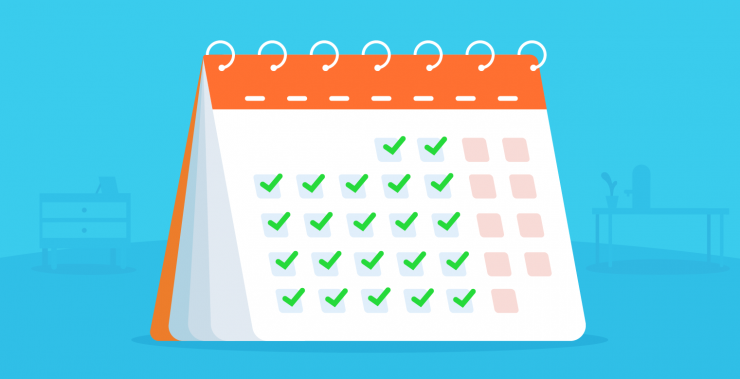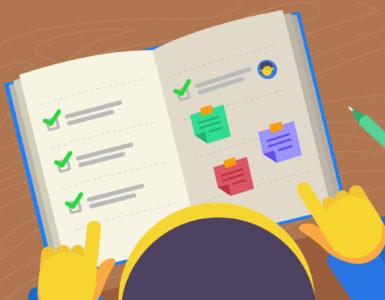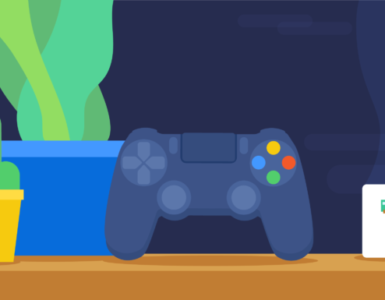Of course, not all days can be the same. You are a human, not a machine. But if you find yourself saying “The to-do list keeps getting longer” more than “I had a very productive day at work”, then you have landed on the right page.
This blog is for everyone – managers, employees, and founders who want to get hold of their day and not get led by the tasks. Whether you’re managing remote teams, balancing back-to-back meetings, or simply trying to get through a mountain of emails, this guide will help you find practical solutions to optimize your daily performance.
Before I begin, I must mention that the spiraling to-do list isn’t necessarily your fault. There are multiple external factors that come into play.
As the employee productivity statistics stated, remote workers lose up to 2.5 hours per day to distractions. Technology, while essential, is often a double-edged sword. Constant notifications, instant messaging, and frequent app switching disrupt focus and make deep work a rare achievement.
You are welcome to take Chanty’s productivity course to maximize your effectiveness at work. Chanty doesn’t just offer communication tools, it also integrates features that help you better manage your time, prioritize what’s important, and collaborate seamlessly with your team.
Chatty coworkers and office noise were highlighted as the top distractions for 80% of workers. It’s worth noting that these disruptions are not limited to physical office spaces. Remote workers often experience similar challenges, like background noise from home or a lack of designated workspace, which can be equally draining. Many respondents also viewed meetings as just another interruption in the way of their being productive. To combat this, many companies are introducing ‘no meeting days’ or setting stricter agendas to ensure meetings are short and focused.
Nevertheless, there is a gamut of other reasons as well. The question is what is it that you can do?
Well, the best you can do is to identify what is impacting your productivity levels and work on it.
Sometimes, it is the little changes that can make a significant difference. It is only ideal to get ready to make the required changes wherever needed to be more productive. Otherwise, the day when all the stress would lead to burnout isn’t far. Remember, making consistent, small adjustments can help you create a sustainable work routine. After all, productivity is about working smarter, not harder.
What’s the meaning of a productive day?
Put simply, a productive day is when you finish your priority tasks or achieve significant results that move your projects forward. It’s not about stretching your working hours to the limit or sacrificing important personal activities such as exercise, spending time with family, or even household chores like doing the laundry. True productivity is balanced and doesn’t come at the expense of your well-being.
But productivity is more than just ticking off items on your to-do list. It involves effective time management, prioritization, and a sense of achievement that leaves you energized rather than drained. At the end of your working day, you should be able to find time for yourself without feeling burdened by a long, unmanageable list of to-do items. This balance ensures that you can focus on your work without sacrificing your overall quality of life.
So, how can you have a productive and satisfying day? Here are 11 actionable tips to help you maximize your workday, complete important tasks, and still make time for your mental and physical well-being.
1. Prioritize the tasks
Ever heard the saying “Eat the live frog first and nothing worse will happen”?
For those who didn’t, it meant doing the most difficult task first and the rest of the day would get easier.
How? This works as you don’t end up running away from the toughest task, and dragging the work hours. AI-driven ChatGPT can save you time by optimizing work processes.
To further explain, it is essential for you to divide the tasks, no matter how long the list is, into two categories- important and urgent. Arrange tasks into these categories in order and analyze. Stop randomly picking tasks from your list or your mind based on what you feel like doing. This way you would always end up doing a lot and still not feeling unaccomplished.
Inculcate the habit of creating this to-do list either before going to bed or when you wake up. It is also a good practice to identify the tasks that can be delegated.
2. Communicate efficiently
As per a survey on Panopto, “Employees spend an average of 5 hours every week waiting to receive the knowledge and inputs they need.”
This becomes a major reason for work getting delayed, or even forgotten or canceled. Here are two ways to tackle such situations:
– If you are the one waiting for a response and the task is not super urgent, hop onto the next task for the day. In case, the inputs are required urgently, consider calling or using Chanty, a team chat tool instead of following up over mail.
– If you are a peer or manager who needs to respond, unless you are not super busy, do the needful. In case you are in a meeting or have blocked time for a task, share an automated reply to emails you receive with, “I am not checking my emails for the next x hours, please call if it is super urgent.”
For the sake of everyone’s productivity, we must also try to keep the communication brief and meaningful. Avoid breathing around the bush and come to the point- meetings, emails, one-on-one chats – everywhere.
3. Take mandatory breaks
Most professionals’ lifestyles are quite sedentary when it comes to the tasks they have to perform. On top of that, it is hard to not lose focus and continue doing one task after the other. Taking short breaks after every hour or every major task is the best thing to do.
Use the time to walk, have a cup of green tea, make calls, or even check your social media, standup comedy, etc. You can use it to refresh your mind and body and do whatever works for you. You could also practice some mindfulness techniques that will help you relax and deal with anxiety throughout the day.
However, remember to not get lost in doom scrolling your social media and get back to the work desk in time to finish the next task. If you try to be overambitious and plan to do all the tasks in a go and then take one long break, things can go down south.
No break-in hours can lead to mental fatigue. On the other hand, if you take breaks, you will have more energy and focus on the tasks ahead.
4. Use a relaxing work chair
Sitting in the same posture in a wrong or uncomfortable chair can lead to back pain and bad posture. If the work is not on-field, most of the time we find ourselves sitting and working on the laptop. Prolonged discomfort not only affects your physical health but also makes it difficult to concentrate on tasks. Over time, this can lead to fatigue, stress, and even chronic conditions like carpal tunnel syndrome or neck strain.
As remote working becomes the norm, ergonomics is more important than ever. Investing in a relaxing chair makes even more sense. Whether at home or in the office, height, width, swivel, and tilt functions are must-haves. Not only do these features provide support, but they can also improve overall productivity by keeping you comfortable and energized throughout the day. A well-designed workspace with proper seating can help you concentrate for longer periods of time and prevent unnecessary distractions caused by discomfort.
5. Create a work schedule
Creating a work schedule is especially helpful for professionals in certain industries or job profiles where they have to work rotational or odd-hour shifts. Work schedule maker helps you plan, check or change your shifts easily.
It gives a clear view of time off requests, sees shift swaps, and results in a major productivity boost. To make your employees adapt and accept it without resistance, look for the one that comes with a mobile app.
6. Exercise regularly
As mentioned earlier, a lot of external factors impact our productivity, and one of them is body movement. Due to the sedentary lifestyle we have, we are prone to eye strain, heart disease, and back pain.
To avoid such problems impacting work and vice versa, you must exercise regularly. It would not just help you stay active but also in keeping your posture in place. It is also believed that good posture makes you confident, and less strained, and slouching/ bad posture can lead to negative thoughts.
For the unaware, physical exercise produces more ATP which is great for your mental and physical energy thereby leading to more productivity. In addition to physical exercise, incorporating mindfulness practices into your routine can enhance your overall well-being and productivity. Take moments throughout the day to center yourself, following the Japanese concept try to reconnect with your ikigai, and cultivate a sense of gratitude for the present moment.
Techniques such as deep breathing, meditation, or mindful walking can help reduce stress, improve focus, and align your actions with your values and goals. By practicing mindfulness, you can enhance your productivity while maintaining a sense of balance and fulfillment in your life.
7. Eat healthy meals
It’s no news that eating a lot of junk food can make you lethargic. This is why it is important to take control of what you eat and how much you eat. Start balancing your meal nutrition and stop eating mindlessly. It’s best to eat more greens and fruits.
It’s best to start your day with a wholesome breakfast with balanced nutrition. Wake up timely, eat mindfully, and not in haste. Start small like work on replacing coffee or tea with smoothies and keep progressing. The better the breakfast, the better the productivity.
For lunch, avoid eating heavily as the body would start utilizing the energy in digesting, you might also feel sleepy. Salads and steamed veggies can be a good choice. However, if you do eat something heavy, have a smaller portion.
8. Manage your time
Checking emails, getting those notifications on the phone, calls, multitasking, and all the noise count as major time killers. You should manage your time better, try time blocking, and begin monotasking.
As per your to-do list, time your important tasks, and in that time framework on them. When you are done with one, take a 10-minute break and then jump on to the next. If the task at hand would take more than 1 or 2 hours, you can follow the 2-minute rule.
You can use this time gap to do the very trivial but urgent tasks at hand and even check and reply to emails. If not, you can fix three times to check emails or take calls- 11 am, 2 pm, and 5 pm. This would ensure you stay undistracted and focused.
Remember, working overtime does not always lead to more productivity.
9. Upskill when commuting
Why do some people at work always seem to be rising the learning curve? That’s because they upskill. While you learn as your work stands true, sometimes you need to learn the new to be more successful.
24 hours is all that we all have. How we use them certainly makes a world of difference. So, If you are unable to find time to learn more, you should try using your commute time for it.
It benefits in more ways than one. You won’t even feel the time pass by and you would be learning instead of wasting your time on social apps or games, or songs.
10. Learn to say NO
The first thing you must apply if your to-do list keeps getting longer is learning the art of saying no. Stop entertaining requests that are not aligned with your performance goals. When you already have a lot on your work plate, it’s only the right thing to reject unreasonable requests.
If not, your to-do list will continue to get longer, adding up to your stress. Remember, how you choose to spend your time in the present, would set the tone for your future ahead.
For instance, if your task for the day is to write a blog, and someone from the sales department requests you to work on a sales pitch that very day; you know what to say – “I can’t take it up today, if it’s critical, please drop a mail to my manager regarding this.”
11. Sleep on time
Disturbing the ideal sleep clock does more harm than you think. It can lead to sleep disorders, but sooner than that, it starts reflecting on your work. Not sleeping on time and for a good 7-8 hours makes you struggle to keep up with anything and everything throughout the day. You are not alert enough!
For those who argue they have a very busy schedule – isn’t it better to get uninterrupted sleep and increase productivity at work than not sleeping enough and reducing your productivity levels notably? Isn’t it better to sleep well enough and feel energized to work better in fewer hours than working for more hours and still not getting things done?
Focus on the outcome, not the hours. If you are a night owl, it would be a little difficult for you but not impossible. Begin by waking up earlier than usual and exercising so that your body is tired enough to sleep early.
What does it take to have a productive day?
Changing your habits isn’t always easy, but with persistence and consistency, progress can be made. The key is to start small and focus on one positive change at a time. Whether it’s eating healthier, prioritizing sleep, setting clear and achievable goals, or incorporating regular breaks and exercise into your day, every step you take contributes to a more productive and balanced lifestyle.
Remember, productivity isn’t just about working harder or longer. It’s about working smarter, focusing on what really matters, and making sure you take care of yourself along the way. By creating a routine that supports both your professional goals and your personal well-being, you can set yourself up for long-term success without sacrificing your health or happiness.
The road to a productive day starts with a decision to improve, and from there, it’s all about consistency. So which of these tips are you going to start with? Will you focus on better time management, a healthier morning routine, or learning to say no? We’d love to hear your thoughts and what works best for you in the comments.










